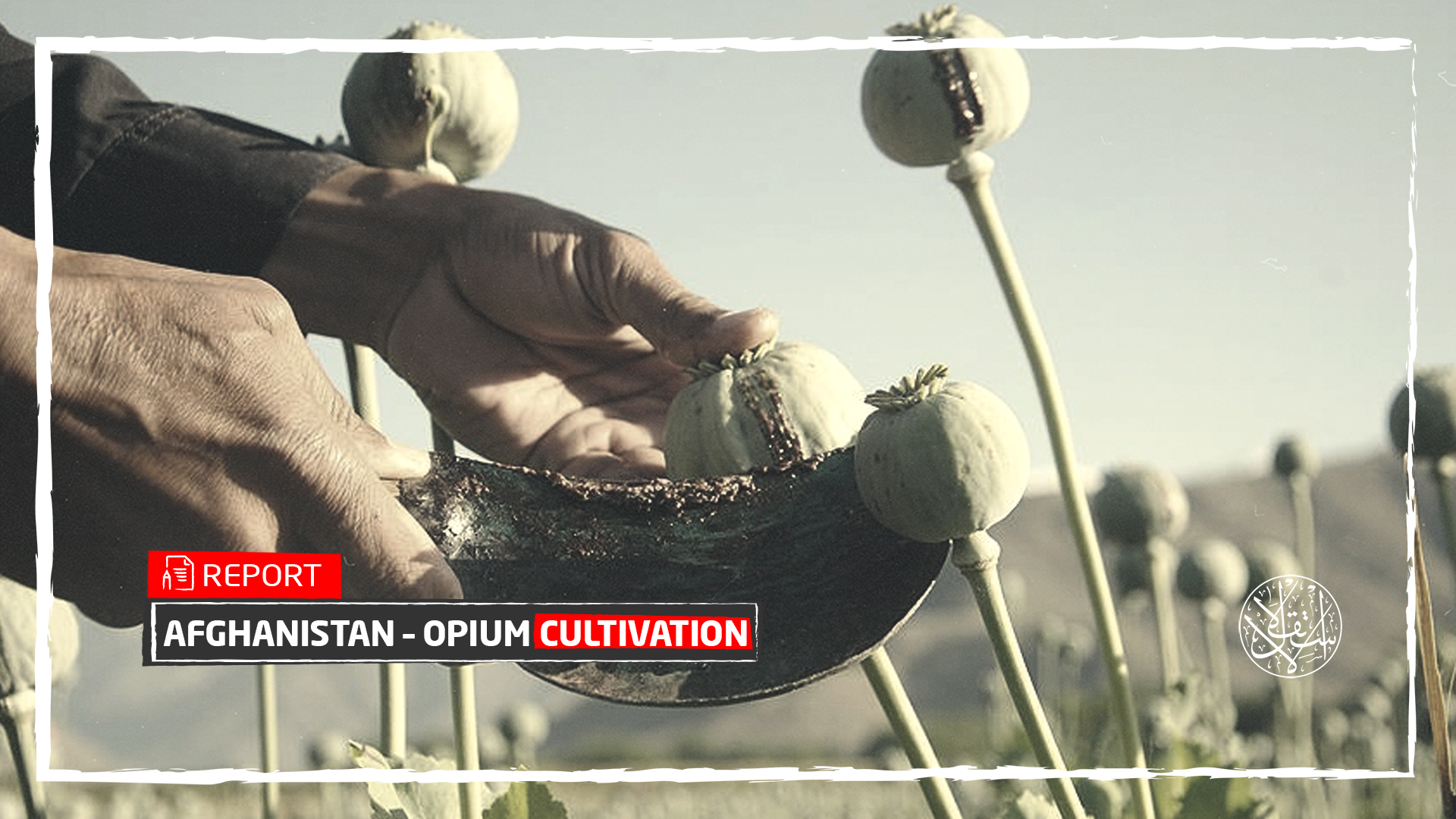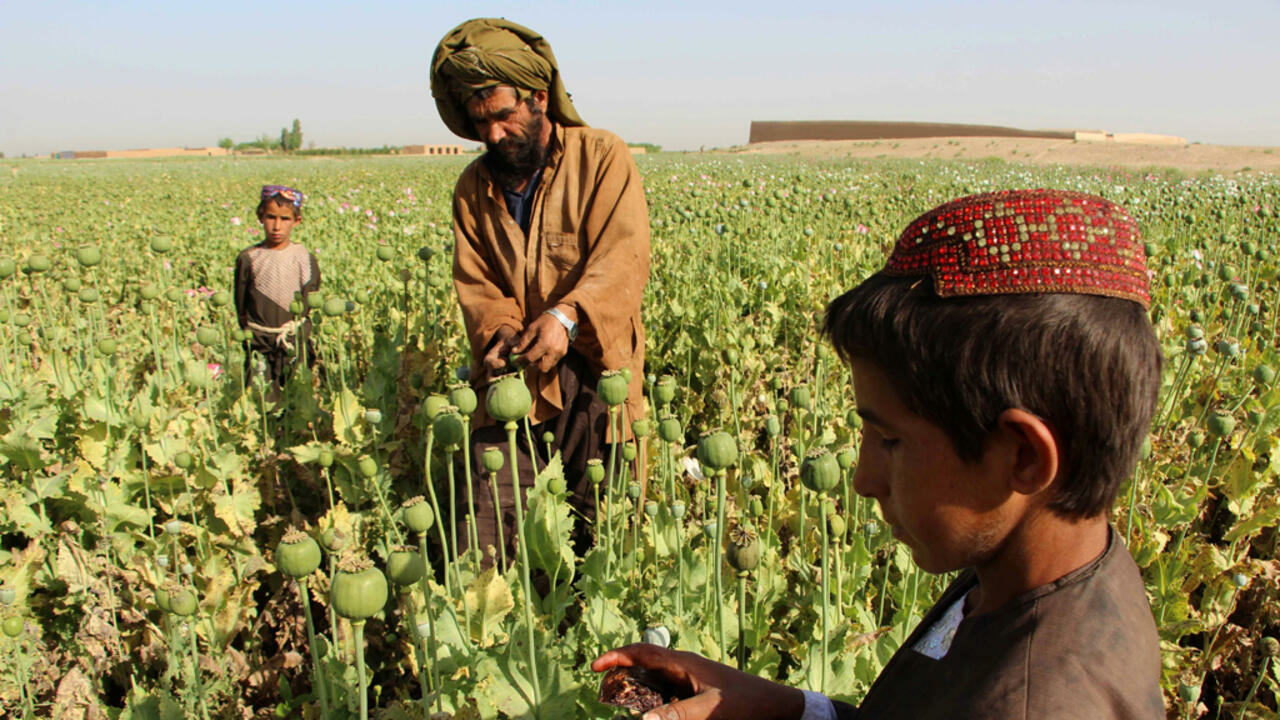What Is the Possibility of the Taliban Ending the Drug Trade in Afghanistan?

For decades, Afghanistan has been associated with poppy (opium) cultivation, which is mainly used in the production of powerful pain killer drugs, and is involved in the manufacture of deadly heroin, with opium cultivation increasing 8 percent in 2021 compared to the previous year.
On April 3, 2022, Afghan Taliban leader Hibatullah Akhundzada ordered a ban on poppy cultivation in the country, saying the offender would be dealt with in accordance with Shariah provisions. The order also prohibited any export, import or transfer of all types of drugs and alcohol.
The Taliban's move, which came to power in August 2021 after the U.S. withdrawal from Afghanistan, has raised pressing questions about its success in ending drug cultivation completely, and what is behind such a decision at the moment?
International Claim
The fight against drugs in Afghanistan has been one of the main demands of the international community of the Islamic group, which has taken over the country's administration, in order to reverse sanctions that severely hamper banking and development.
U.S. and NATO forces have tried to curb poppy cultivation for two decades in Afghanistan by paying farmers to grow alternative crops such as wheat or saffron.
Taliban opponents say the group has thwarted their attempts, taken control of key poppy-growing areas and made hundreds of millions of dollars from the trade.
But current Afghan Deputy Prime Minister Abdul Salam Hanafi rejected allegations that the Taliban helped grow poppies during the period before they took power in the country.
"How was it exported all over the world when (U.S.-led forces) were in full control of Afghanistan?" Hanafi asked on April 3rd.
Hanafi accused officials of previous governments of involvement in the cultivation and trade of drugs, saying that 95 percent of the narcotics grown and produced were in areas previously under the authority.
On April 3, 2022, Reuters quoted farmers and Taliban members as saying that Afghanistan's opium production, estimated by the United Nations at its peak in 2017, had increased in recent months.
The country's deteriorating economic situation has prompted residents of the south-eastern provinces to grow illicit crops that can bring them higher returns and more quickly than legal crops such as wheat.
The agency reported that the decision to ban the Taliban on drugs came at a time when the movement was trying to gain international legitimacy to rule after it took power.
After the Taliban came to power in 2021, foreign aid to Afghanistan declined, creating severe economic challenges.
As the country's economic crisis has been exacerbated by the interruption of international aid, Afghans are increasingly turning back to the highly profitable drug sector.
On April 3, 2022, Afghan Deputy Interior Minister for Drug Control, Aqd al-Haq Hamkar, reported that there were 3.5 million addicts in the country, 20,000 of whom were being held in treatment and rehabilitation centers, two decades after the increasing production of drugs in an orderly and widespread manner, he said.
Hamkar said his government is building a drug treatment complex for some 30,000 people, saying the past eight months have seen the arrest of a number of the country's major drug traffickers.
Fulfilling Pledges
Following its takeover of Afghanistan in 2021, the Taliban pledged to combat opium cultivation, drug trafficking and the elimination of this type of production.
During the first period of Afghanistan's rule between 1996 and 2002, the Taliban banned opium production, which fell to 185 metric tons in 2002, but following its overthrow, opium production rose again.
Thomas Ruttig of the Afghanistan Analysts Network said in remarks on December 20, 2021, that the Taliban have not been the main driver behind Afghanistan's so-called "drug economy" in recent years.
"The previous government competed with the Taliban to strengthen its influence in rural areas and many of its men were directly involved in drug trafficking," Ruttig said.
Western forces deployed in Afghanistan since 2001 had cooperated with a number of warlords, leaders and government officials who had also been involved in drug trafficking, he said, noting that the forces had made little effort to stop the trade.
With regard to the Taliban's pledges to fight opium production, Ruttig said the group is not serious about it, adding, "It doesn't want to, it can't do it because it means it's going to lose a lot of supporters in Afghanistan’s main rural areas."
Gretchen Peters, the U.S. author of " Seeds of Terror: How Heroin Is Bankrolling the Taliban and al Qaeda," said the ban was tactical, claiming that the group's elements were "so tied to this trade" that they could not put an end to it, and that poor country "could not live without opium."
"Taking control of the country will give the Taliban access to airlines, government bureaucracy and banks, which can be used to facilitate drug trafficking and money laundering," Peters said. "I have no doubt that they will take advantage of it," she said.

High Production
On November 16, 2021, the UN Office on Drugs and Crime confirmed that Afghanistan’s opium crop rose 8 percent in 2021 from 2020 to 6,800 tons.
The UN Office on Drugs and Crime found that Afghan opiates supplied 8 out of 10 opium users worldwide during an expert meeting in Vienna to combat illicit trafficking.
According to a research summary by the United Nations Office on Drugs and Crime on "The Drug Situation in Afghanistan 2021, the latest emerging results and threats," Afghanistan accounted for 85 percent of global opium production in 2020.
"The new research summary on opium harvesting was completed in 2021 in July, and the overall drug situation in Afghanistan highlights the urgent need for international assistance to promote sustainable reductions in illicit drug cultivation, production and demand," said Ghada Wali, executive director of the UN Office on Drugs and Crime.

According to the research results, income from Afghan opiates ranged from $1.8 billion to $2.7 billion in 2021 inside Afghanistan, but much more profits are being made in illicit drug supply chains abroad.
Increased political uncertainty in Afghanistan since August 2021 has led to higher opium prices, which nearly doubled that month compared to May.
The summary warned that, in addition to the high production of opium and heroin, the manufacture of methamphetamine (a tonic type) in Afghanistan has increased sharply in recent years through the use of wild Ephedra.
The United Nations Office on Crime and Drugs also warned that high regional and global demand for methamphetamine, coupled with a global market saturated with opiates, could further expand the manufacture of methamphetamine, as well as other synthetic drugs.
Sources
- Taliban ban poppy cultivation. And you promise violators [Arabic]
- Taliban leader orders ban on poppy cultivation in Afghanistan [Arabic]
- Taliban seek international support to ban drug cultivation [Arabic]
- Afghanistan: Rising opiate production, fears of crop increases next year and flooding global markets [Arabic]
- The Taliban are preventing poppy cultivation. Opium, which Afghanistan is the world's leading producer, extracts from it [Arabic]
- Despite the Taliban's promises. Opium thrives in Afghanistan [Arabic]
- Figures on returns, production and addiction. Taliban bans cultivation, trade and drug industry [Arabic]












